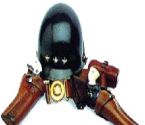ORIGINAL: Von Rom
Here are some comments about Patton by high ranking German Officers:
I have some as well.
The Germans respected Patton’s strategy and admired its genius, calling him the Allies' "most modern" commander.
Please cite source.
German Major General Schimpf of the 3rd Paratroop Division called Patton’s campaign in the Palatinate "phenomenal."
Interesting. I think it was Chester Wilmott who pointed out that Von Rundstedt's Panzer divisions had been withdrawn from the area. The line was already largely shattered when Patton jumped off and there were no reserves left to restore the situation. Once again we have Patton in his element, driving through a defeated enemy. I've already stated he could drive tanks like no one else in the Allied Army provided there was nothing to block his way. He was a logistician.
Rommel wrote that, "We had to wait until the Patton Army in France to see the most astonishing achievements in mobile warfare."
We've discussed this in detail. You are yet to illustrate that Patton did anything more than what I basically described above. A fast armoured drive through a shattered enemy (an enemy shattered by others). The drive was flawed as the joy ride through Brittany illustrates and the advance of Montgomery through France after Falaise was closed was also impressive.
As Guderian writes:
There was a great shortage of troops that could not be made up. Hence Patton in his race across France found no real resistance
Von Rundstedt:
Von Rundstedt simply called Patton our "best."
Whether true or not, this doesn't mean he was good. Merely that the Allies were generally poorly led at Army level.
General Fritz Bayerlain, the able commander of the Panzer Lehr Division and a veteran of North Africa, assesses the escape of Rommel's Panzer Armee Afrika after Alamein: "I do not think General Patton would have let us get away so easily (as Monty had)" (D'Este, p.815).
No Allied Commander would have pursued Panzer Armee Africa as poorly as Montgomery did. It was beaten, I've already stated that Patton could drive Tanks. This statement is probably a true reflection. He would have chased a lot harder. In Monty's favour, Patton would have had more problems breaking down the German positions at El Alamein.
I could also quote Max Simon speaking specifically about 3rd Army:
The tactics of the Americans were based on the idea of taking down a wall by taking out one brick at a time. They did this with tanks against which we had nothing to employ. However, since your attacks were divided amongst several local attacks instead of being concentrated at one point, we, with adequate equipment could have repelled these attacks and rejoined our broken line.
Simon is pointing out that "our best" did not know how to employ armour when attacking defended positions. There was no concentration, no Schwerpunkt, just attack everywhere. You see it time and again with Patton. A wide assault into the weak German lines on the southern shoulder of the Ardennes. Pointless frontal attacks on Metz. Again in November 1944 in the Saar area, against a weak German front line, Patton could only attack everywhere. No real point of concentration. As a result, these weak German defences could only be pushed back 15 miles in 8 days. With every unit attacking, Patton could not and did not concentrate his artillery to allow a decisive breakthrough.
Patton himself wrote to his wife explaining what he had attacked the German front line at it's strongest point:
because a straight line is the shortest distance between points
Does anyone think that Guderian, Hoth, Kleist, Rommel, Manstein, Balck and a hundred other recognised exponents of armoured warfare would ever have thought like this??????
On the debit side, he had so many bad points that ultimately, History's judgement can not be favourable.
For the record, Patton had no equal on the Allied side in pursuit of a beaten enemy. Put him in front of a front line that was at least cohesive and he had no more success than anyone else. Anyone who believes otherwise, please cite an operation that we can debate. Please lets not go on quoting other sources saying the same things. We can only discuss this by analysing his operations, I refuse to accept that someone was good or bad merely because someone else said so.
regards,
IronDuke










